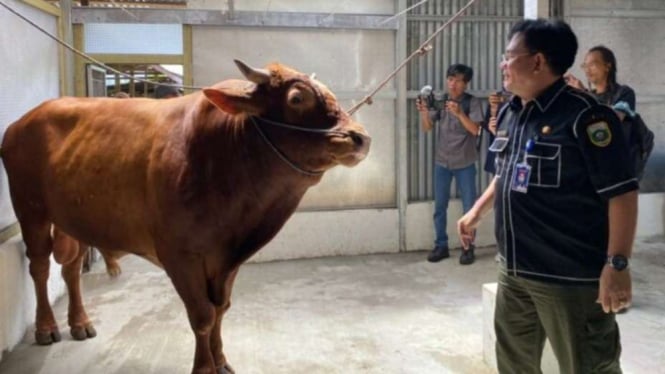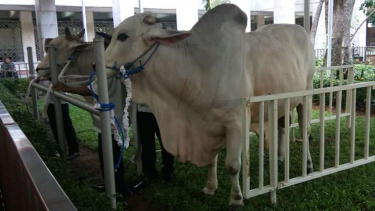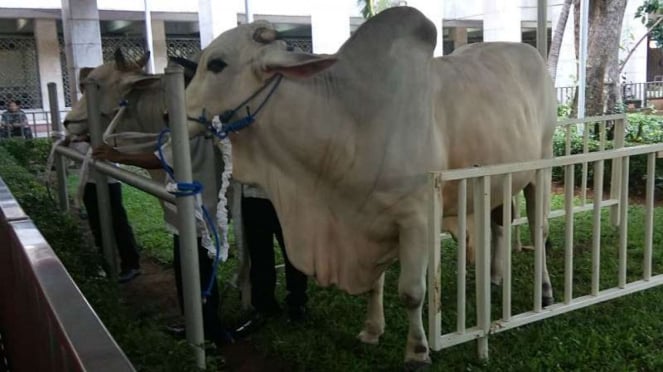History of Prophet Ibrahim's Qurban as the Beginning Eid al-Adha
- VIVA/ Sadam Maulana
VIVA – The history of Prophet Ibrahim's Qurban, which marks the beginning of the Eid al-Adha commemoration, is an important event in Islamic tradition. It is a story that demonstrates Prophet Ibrahim's unwavering faith and submission to Allah's command.
According to Islamic beliefs, Prophet Ibrahim was a prophet sent by Allah to guide people toward monotheism. He lived thousands of years ago in the region that is now present-day Iraq and is considered one of the greatest prophets in Islam.
The story of Prophet Ibrahim's Qurban is narrated in the Quran and Hadith (sayings and actions of the Prophet Muhammad).
According to the Islamic narrative, Prophet Ibrahim and his wife Sarah were childless for a long time. As they grew older, Prophet Ibrahim prayed to Allah for a righteous child.
Ilustrasi sapi kurban di Masjid Istiqlal.
- VIVA.co.id/ Jeffry Yanto
Allah answered his prayer and blessed Prophet Ibrahim and Sarah with a son named Ismail. Ismail grew up to be a pious and obedient young man, and Allah tested Prophet Ibrahim's devotion through a remarkable command.
In the story, Allah commanded Prophet Ibrahim in a dream to sacrifice his beloved son Ismail as an act of obedience.
Prophet Ibrahim, being a steadfast believer, recognized this as a divine test and decided to fulfill Allah's command. Both Prophet Ibrahim and Ismail demonstrated immense trust in Allah and were willing to sacrifice for His sake.
As they prepared to carry out the sacrifice, Satan attempted to dissuade them from their duty. However, both Prophet Ibrahim and Ismail repelled Shaytan's temptations by throwing pebbles at him, symbolizing their rejection of evil and steadfastness in their faith.
Just as Prophet Ibrahim was about to sacrifice Ismail, Allah intervened and substituted a ram in place of Ismail. This divine intervention demonstrated that Prophet Ibrahim had passed the test of his faith, and Allah was pleased with his unwavering devotion.
The act of sacrificing the ram instead of Ismail became a significant symbol of Prophet Ibrahim's submission to Allah's command.
Muslims commemorate this event by performing animal sacrifices on the day of Eid al-Adha, which means the "Festival of Sacrifice." It is one of the most important festivals in the Islamic calendar.
During Eid al-Adha, Muslims around the world commemorate Prophet Ibrahim's obedience and devotion by sacrificing an animal, such as a sheep, goat, cow, or camel.
The meat from the sacrificed animal is divided into three parts: one part is kept for the family, one part is given to relatives and friends, and the remaining part is distributed among the poor and needy.
Eid al-Adha is also a time for Muslims to come together for prayers, reflection, and community gatherings. It is a celebration of faith, gratitude, and generosity.
The festival marks the end of the Hajj pilgrimage, which is an annual Islamic pilgrimage to the holy city of Mecca in Saudi Arabia.
In summary, the history of Prophet Ibrahim's Qurban marks the beginning of the Eid al-Adha commemoration in Islam. It symbolizes Prophet Ibrahim's unwavering faith and submission to Allah's command to sacrifice his beloved son Ismail.
Muslims commemorate this event by performing animal sacrifices and engaging in acts of charity and community spirit during Eid al-Adha.



























